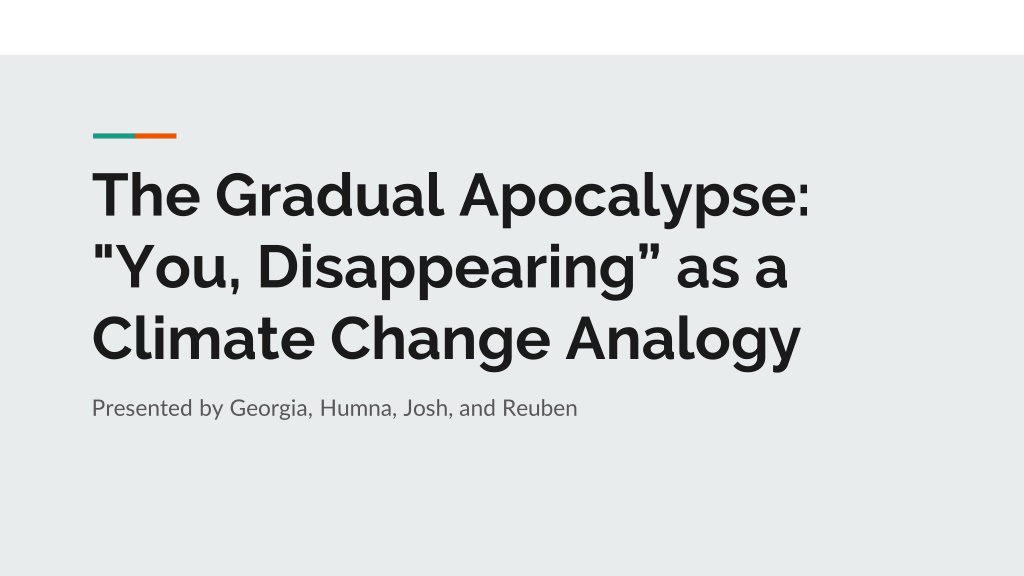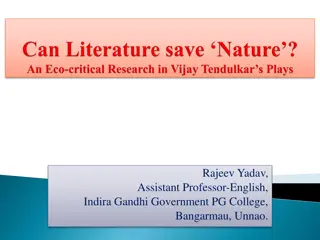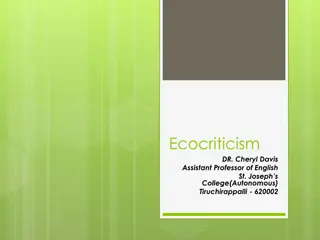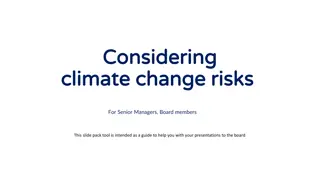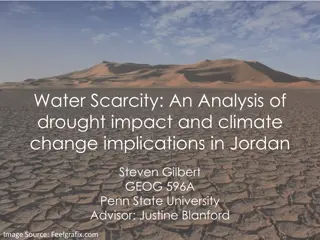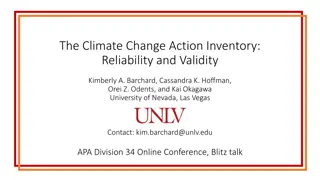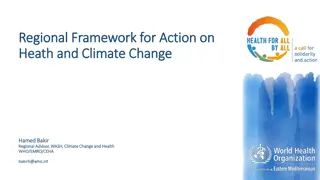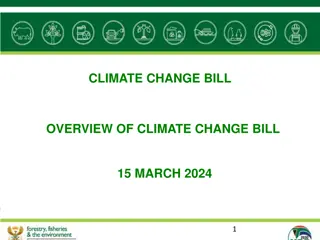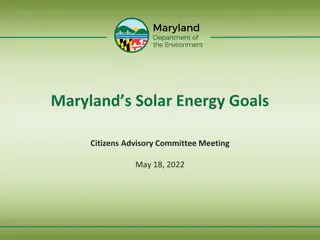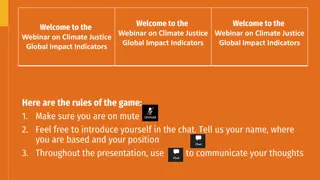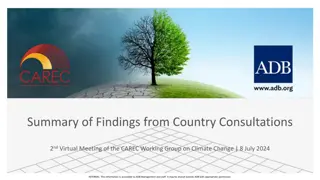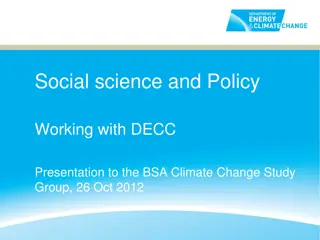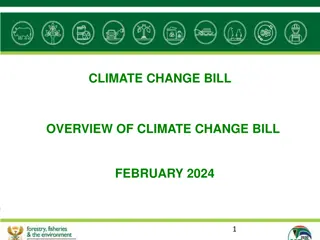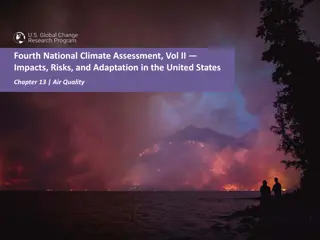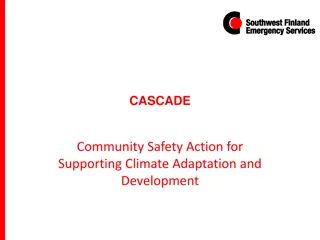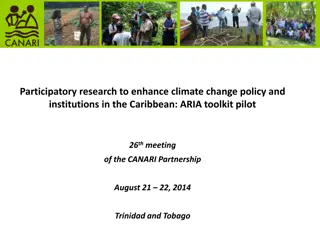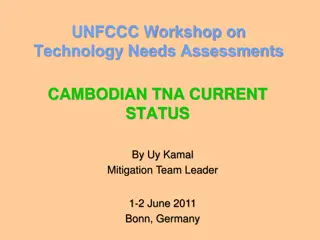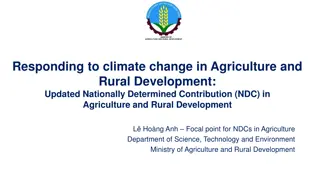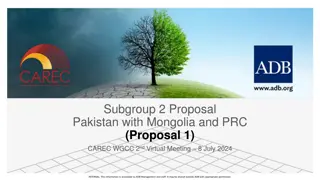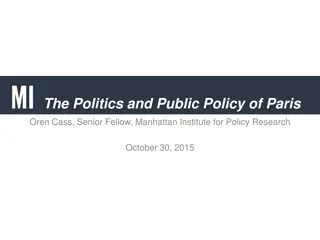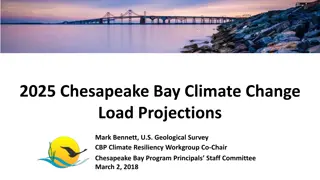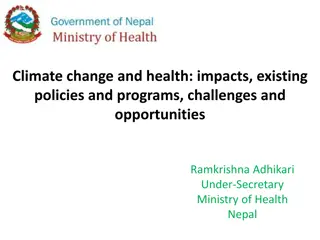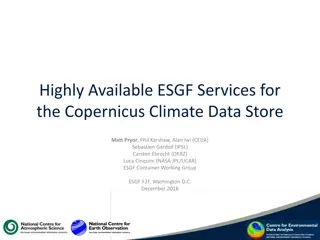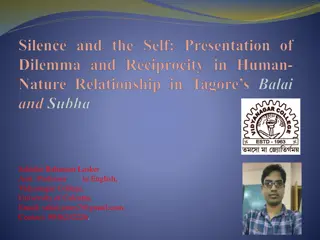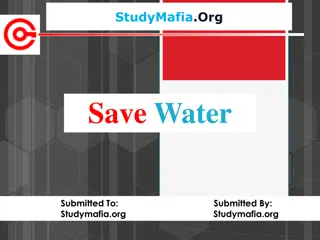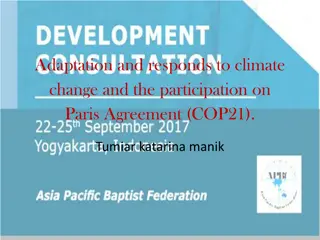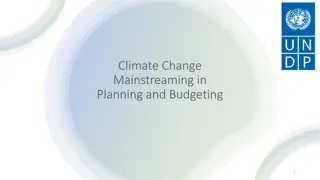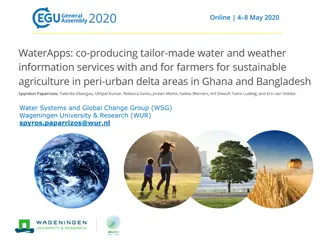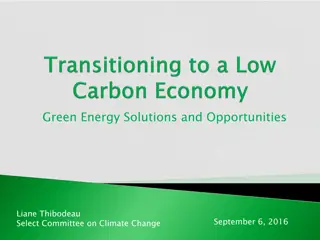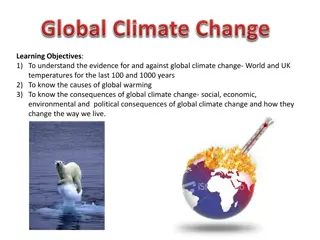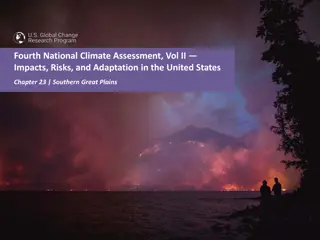Exploring Climate Change Through Ecocriticism in "You, Disappearing
The short story "You, Disappearing" by Alexandra Kleeman is analyzed as a climate change analogy through the lenses of materialism, human-animal relationships, and cultural geography. The research delves into ecocriticism and the metaphorical exploration of a future shaped by global warming, emphasizing the evolving nature of materialism and the significance of human-animal interactions in addressing climate change.
Download Presentation

Please find below an Image/Link to download the presentation.
The content on the website is provided AS IS for your information and personal use only. It may not be sold, licensed, or shared on other websites without obtaining consent from the author. Download presentation by click this link. If you encounter any issues during the download, it is possible that the publisher has removed the file from their server.
E N D
Presentation Transcript
The Gradual Apocalypse: "You, Disappearing as a Climate Change Analogy Presented by Georgia, Humna, Josh, and Reuben
You, Disappearing by Alexandra Kleeman Short story about an apocalypse scenario where things are slowly disappearing Will explore this short story as a climate change analogy through: Materialism Human-Animal Relationships Cultural Geography This type of research is part of a field called ecocriticism.
Ecocriticism This is looking at the relationship between humans and nature About the essence of our existence One example of an ecocritical idea would be anthropocentrism We argue that the short story we were looking at explores a metaphorical interpretation of what the future will be like with global warming
- Constant references and abstract descriptions of objects could show the evolution and development of materialism, from a mentality to a reality. E.g. a chunk of plastic that threaded its way delicately to me over hundreds of miles of wire and cord. refers to a phone, yet it is almost mentally disassembled as the construct of materialism changes. Materialism [m t r l z( )m] NOUN 1. a tendency to consider material possessions and physical comfort as more important than spiritual values. - TWO SIDES TO THE ARGUMENT OF MATERIALISM The reactions of humanity towards the disappearance of their possessions is a direct display of materialism at its peak. Within You, Disappearing , we are shown a dystopian future in which humanity (along with the world itself) is becoming less and less materialistic. People are so attached to objects rather than each other that, as these objects begin to disappear, the situation is presented as apocalyptic. People are developing closer connections and attachments to each other rather than objects. such efforts can lead to paradoxical situations whereby values known to be incongruent with engagement with climate change (e.g. materialism) are used as the basis of campaigns to engage the public. ...and even individuals who score highly on measures of materialism have been shown to identify with and be receptive to messages framed using self transcendent values (at least, under certain conditions). You, Disappearing presents climate change through the lens of materialism. Materialists can be persuaded to fight climate change if the message relates to something higher than themselves.
Human-Animal relationship The focus on animals highlights how they are significant to climate change, this was ignored before. Changes in human relations with animals have been one of the key drivers for increased attention to climate change, it could be argued that relating household animals (such as cats, dogs etc.) to animals allow increased sympathy towards the environment and climate change. Represented emotionally within You, disappearing rationalization leading to full resource use at the cost of intimate human-animal relations Rebecca Cassidy. People with animal centred livelihoods experiencing minor changes in climate find the ability of their animals to fulfil some things that may have gone. Animals are tools used to their own use. . The rational exploitation or maximal resource use of animals Rebecca Cassidy. Explains how the relationship between humans and animals is dependent due to the selfishness of humans. Even with domestic animals, they are there due to our own emotional attachment and thus humans are inherently selfish. The increased attention to a cat shows how animals are always relied upon and there in the background but one they are gone you notice the impact. a short parametric definition of a cat , animal invisibility.
Cultural Geography + Sense of Place Cultural geography: The study of cultural products and norms and their variations across and relations to spaces and places. The author of You, Disappearing , Alexandra Kleeman, could have metaphorically presented cultural geography sub-consciously to express the economic east/west divide and how this is contributing to climate change. Was it moving geographically from west to east, or east to west? Links back to the materialism of people and how our world is disappearing (rising sea levels, etc). Could also bring up the political argument of who is truly to blame for the contribution to climate change. Mike Hulme spoke about how our relationship with climate change is dangerous. We have often worried about this possibility and now this knowledge claims of science have offered new reasons to be concerned. The author also holds a mainly holds an American perspective repeating American cities such as Arizona and Chicago . This could link to the financial divide. Nixon stated within Slow Violence and the Environmentalism of the Poor about how richer countries benefit and poorer countries suffer.
Conclusion We have shown that the way the story talks about human-object relations (materialism), human-animal relations, and the relationship between different parts of the world (cultural geography) relates to concerns about climate change. In conclusion, the story s use of a gradual apocalypse can be understood as a message of warning about the possible effects of our actions if we continue to ignore the signs of climate change. Things could be changing now that we aren t noticing but we should try to notice them. It s only the beginning and we have a chance to try to fix it.
References Cassidy, Rebecca. Lives With Others: Climate Change and Human-Animal Relations. Annual Review of Anthropology, vol. 41, no. 1, 2012, pp. 21 36., doi:10.1146/annurev-anthro-092611-145706. Corner, Adam, et al. Public Engagement with Climate Change: the Role of Human Values. Wiley Interdisciplinary Reviews: Climate Change, vol. 5, no. 3, 2014, pp. 411 422., doi:10.1002/wcc.269. Garrard, Greg. Ecocriticism. Routledge, 2014. Ghosh, Amitav. The Great Derangement: Climate Change and the Unthinkable. The University of Chicago Press, 2017. Hulme, Mike. Geographical Work at the Boundaries of Climate Change. Transactions of the Institute of British Geographers, vol. 33, no. 1, 2007, pp. 5 11., doi:10.1111/j.1475-5661.2007.00289.x. Kleeman, Alexandra. You, Disappearing. Guernica, 16 Sept. 2016, www.guernicamag.com/you-disappearing/. Nixon, Rob. Slow Violence and the Environmentalism of the Poor. Harvard University Press, 2013. Vint, Sherryl. Animal Alterity: Science Fiction and the Question of the Animal. Liverpool University Press, 2014. Westling, Louise Hutchings. The Cambridge Companion to Literature and the Environment. Cambridge Univ. Press, 2014.
